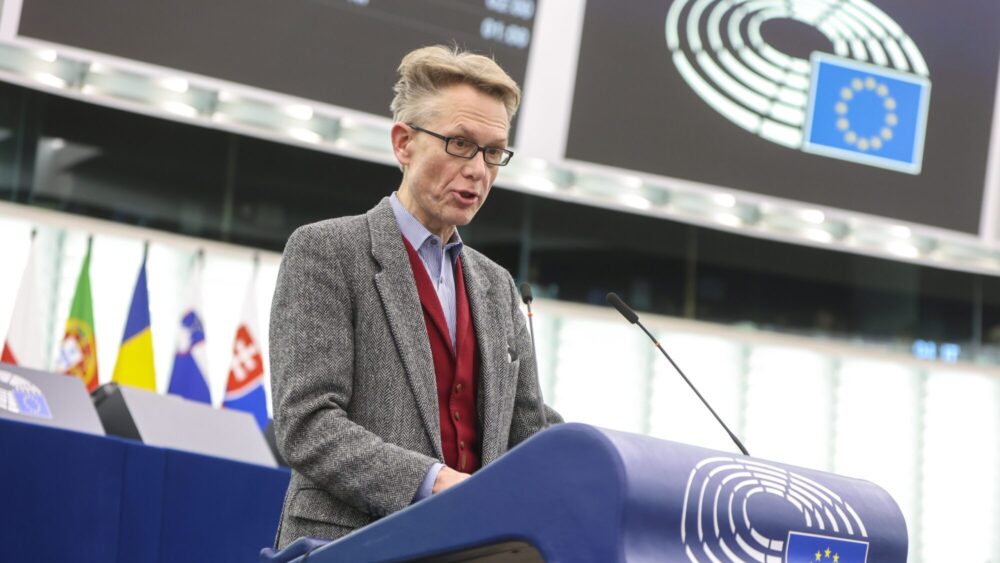
Gunnar Beck, MEP
Photo: Frederic MARVAUX/© European Union 2022 – Source : EP
A German MEP has uncovered major flaws in the European Commission’s account of an investigation into the Romanian motor insurance industry, following The European Conservative’s revelation that a business close to Commission President Ursula von der Leyen’s brother stood to benefit from lax EU regulation in the sector.
This follows complaints by a number of MEPs that EU institutions were withholding key information about the investigation, and claims of manipulation by Romanian regulators.
The spotlight is on the Romanian motor insurance industry over allegations that a major firm (Euroins) was unduly forced out of the domestic market after its licence to trade was revoked. The company claims it was the target of a campaign of commercial harassment by the Romanian regulator for the insurance sector, Autoritatea de Supraveghere Financiară (ASF).
The Romanian motor insurance sector has had a reputation for corruption and links to organised crime. Euroins is said to have found itself on the wrong side of the authorities after refusing to bail out a failing rival, City Insurance, in 2019.
In March of this year, ASF suspended Euroins’s operating licence in Romania, citing insolvency problems, an accusation that Euroins has challenged in court.
Due to the fact that Eurions was Romania’s largest provider of third-party liability insurance, the ASF decision poses an existential challenge to the future of the Romanian motor insurance sector. This judgement has raised fears that Romanian drivers could be dropped for any type of coverage at home and abroad.
Despite attempted mediation by the European Bank for Reconstruction and Development (EBRD) to conduct an independent assessment of Euroins’s financial health, the ASF refused any second opinion. However, it did accept advice from the EU’s insurance regulator, the European Insurance and Occupational Pensions Authority (EIOPA).
This culminated in yet another hotly-contested report from the EIOPA, the contents of which were heavily redacted, holding back information from MEPs who questioned both the EIOPA’s and ASF’s findings into the affair.
Both Euroins and other third parties have pointed to the shroud of secrecy surrounding the EIOPA report. They assert that the findings were kept largely concealed from the company despite it being the object of the investigation.
Now AfD MEP Gunnar Beck has called into question the extent to which the European Commission, specifically financial services commissioner Mairead McGuinness, knew about the matter, casting doubt on an earlier assertion by the Commission that it had properly reviewed the EIOPA report.
In answer to a parliamentary question in April, the Commission claimed it had reviewed the case on the basis of the EIOPA report and that the ASF hadn’t broken any EU laws. Beck contradicts this assertion, pointing out that according to an appeals ruling by the European Supervisory Authorities and a subsequent statement made to him by McGuinness, the Commission did not have access to the EIOPA report when it ruled no wrongdoing had transpired.
McGuinness’ office confirmed that the EIOPA report was not shared with either the Commission or Euroins on the grounds of “confidentiality,” lending credence to the belief that the EU was flying blind when it dismissed claims of corruption against the Romanian regulator.
Speaking to The European Conservative, Beck questioned howthe Commission could assert there was no wrongdoing when Euroins’s licence was removed without having access to the EIOPA report. The MEP raised the possibility that the ASF fed European regulators “potentially fraudulent” information.
Beck asks,“Why did the European Commission base its assessment on an EIOPA decision it didn’t even receive, let alone read?” His question underscores serious rule of law concerns, as Euroins did not have access to a report that was instrumental in harming their company. He continued:“The question is: why the secrecy? Why wasn’t the EIOPA report shared? The involvement of von der Leyen’s brother in Superbet, which indirectly profited from the decision, adds suspicion to the whole matter.”
Von der Leyen’s brother is the chairman of Superbet, a company with the same owner as Eazy Asigurari, the rival of Euroins that has just been granted a licence by ASF.
A spokesman for Euroins confirmed to The European Conservative that they were pursuing multiple lawsuits at a Romanian and EU level against the actions of ASF. The spokesman also said it was their opinion that the regulator “breached numerous national and EU laws” in their decision to remove their trading licence. The firm also stated that it believed that the Commission’s failure to see the EIOPA report in full did “not comply with the fundamental principles of the good and transparent governance and the values” of the EU.
In recent months, the Commission has been accused of turning a blind eye to allegations of corruption in Romania for political convenience, reflecting the pro-EU sympathies of the government in Bucharest.
While EIOPA did not respond to press inquiries at the time of publication, a spokesperson for McGuinness’ office stated that the EIOPA had no obligation to respond to requests for information by MEPs due to the need for corporate secrecy and that the Commission discovered no legal issues in the conduct of the ASF.
At this stage, there is no suggestion of professional misconduct by von der Leyen, Hans-Holger Albrecht or Superbet.
